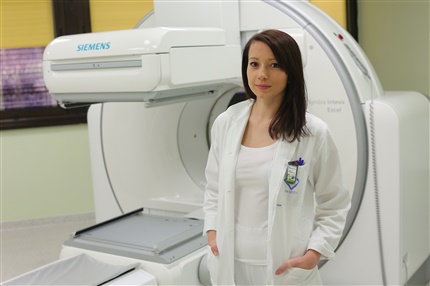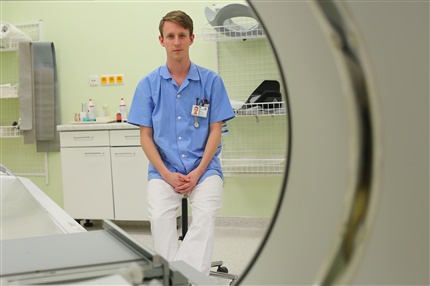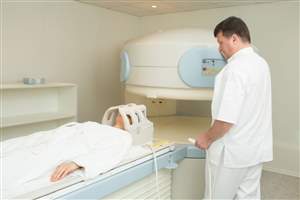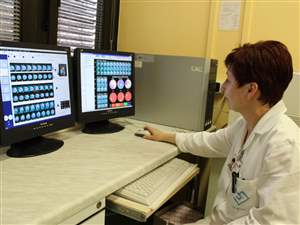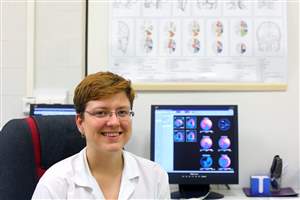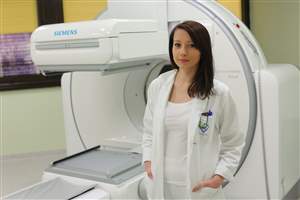A brief overview of Nuclear Medicine and Endocrinology Specialized Center
In the Specialized Center of Nuclear Medicine and Endocrinology we treat patients from the whole of the Czech Republic. In the department, we focus mainly on the diagnosis and treatment of patients with differentiated carcinoma of the thyroid gland and severe forms of thyroid orbitopathy using the 131 I-MIBG therapy. In addition, we carry out standard radio isotopic diagnostics.
We have already attended to the needs of more than 20.000 patients. In 2014, 1.000 patients were hospitalized, and 4.000 outpatients underwent treatment that included various types of examinations and therapeutic applications of radioactive pharmaceuticals.
In the case of the radiation-navigated surgery for breast cancer, or melanoma of the vulva and cervix carcinoma, our specialists cooperate closely with surgical departments.
How will your detailed schedule look like? What type of procedures, methods or treatment can you observe? Check what can you see by shadowing every member of the mentoring team.
Is this specialty placement ideal for you?
- Nuclear Medicine and Endocrinology are a perfect choice for those of you, who are interested in medicine as well as in physics or science. Why? You will see the application of the thyroid gland oncology treatment, as well as other types of treatment that require the most advanced radiation equipment. That is why is important to respect the instructions of your mentoring team. The gamma cameras and other special devices are maintained daily to provide 100% precise results of patients´ examinations. Caution, passion for physics and couriosity need to be your key streaks here.
- Future doctors and engineers focused on healthcare are the right people who should choose this placement. It is great opportunity to witness the scientific progress and how it is applied in daily treatment and particular cases. You will definitely appreciate the sophisticated devices the center possess.
Let's take a closer look at the specialties…
Our center comprises two departments – Nuclear Medicine and Endocrinology. Administering a small amount of radioactive substance into the body in order to diagnose, determine and treat a disease - typically cancer is the purpose of Nuclear Medicine. These radiopharmaceuticals target a specific organ or the cellular receptors. External detectors are then able to turn the radioactivity emitted from the radiopharmaceuticals into images. Sections of the thyroid, heart, liver, bones, lungs or the gallbladder can be the imaged the most easily. Nuclear Medicine is valuable when our colleagues from various departments need to make a quick diagnosis.
The department of Endocrinology is concerned with diseases that are caused by changes in blood hormone imbalances that occur when there is a disruption to the glands and organs involved in the endocrinal system. The aim of the treatment is to restore the body's normal hormonal balance.
Our workplace, which is the only one of its kind in the Czech Republic, is a center for the treatment of TAO (Thyroid-Associated Orbiopathy) inhibitors of growth hormone, for the diagnosis and therapy of advanced forms and differentiated thyroid cancer using recombinant human TSH (Thyrogen) and for the treatment of neuroendocrine tumors using the 131I-MIBG radiopharmaceutical. For each patient, the correct power of dosage administered needs to be carefully monitored. But the patients are not the only ones who are constantly evaluated. Our gamma cameras are checked daily to ensure that we provide the highest quality of examination and treatment of our patients.
In terms of our unique technological equipment we are proud to mention that in the outpatient department of Nuclear Medicine we have a SPECT / CT camera Symbio Inteva Excel and in our ward a two-headed camera with crystal 5/8 “Symbio S.
Also, we have modernized our radiopharmaceutical laboratory reaching the level of C grade.
Our center consists of the following specialized outpatient facilities:
- Endocrinology and diagnosis of differentiated carcinoma of thyroid gland (DTC); the dispensary has over 13.800 patients (this is one of the largest cohorts in the world)
- Cystic fibrosis
- Consulting on Medullary Thyroid Carcinoma (MTC)
- Thyroid-Associated Ophthalmopathy (TAO)
- Nuclear Medicine Department
Who do we take care of?
Our team focuses on the diagnosis, treatment and preventive treatment for patients with tumors of the thyroid gland, as well as for patients diagnosed with more serious forms of thyroidal orbitopathy. We provide assistance throughout the entire range of our specialization in the field of nuclear medicine diagnosis. Also, we ensure consulting services in the field of endocrinology and offer super-consulting services (specialized in thyreology) for individual endocrinologists within the University Hospital in Motol.
In the ward, we treat, nationally, differentiated thyroid carcinoma patients with radioiodine and patients with certain neuroendocrine tumors with 131I-MIBG. The ward has 34 beds, divided into two departments – diagnostic and therapeutic. The Endocrinology part of our center focuses on consulting examinations in the fields of thyreology, calciophosphate diseases and metabolic diseases of the adrenal glands. Our skilled professionals provide the treatment and monitoring of patients with differentiated and medullary thyroid carcinoma. In addition, they provide comprehensive care to thyreoncological patients and perform the sonographic examination of the thyroid using the targeted aspiration fine needle biopsy.
In the outpatient department of Nuclear Medicine we offer a wide range of scintigraphic examinations (bone scintigraphy, nuclear nephrology, cardiology, cancer diagnostics, Pneumology, examination of the CNS or thyroid diagnostics) in both, pediatric and adult patients, as well as the palliative treatment of bone metastases and radionuclide synovectomy. We also cooperate with surgical facilities in the radiation-navigated surgeries.
Our methods and procedures
Our coordinated team performs these procedures within the department:
- Diagnosis and treatment of differentiated carcinoma of the thyroid gland using human recombinant thyreostimulation hormone
- Diagnosis using a hybrid combination of X-ray (CT) scanning and isotope (SPECT) imaging
- The introduction of new radiopharmaceuticals in clinical practice such as Tectrotyd-99m
- Clinical testing of new pharmaceutical for the therapy of medullary carcinoma and radioiodine-refractory differentiated thyroid carcinomas
- The provision of genetic testing in patients with familial forms of medullary thyroid carcinoma
How does the usual schedule look like?
- The schedules of the placement are regular as the procedures are planned in advance. Your mentoring team will present you with your detailed schedule on Monday morning, we guarantee 25 hours weekly as a minimum.


